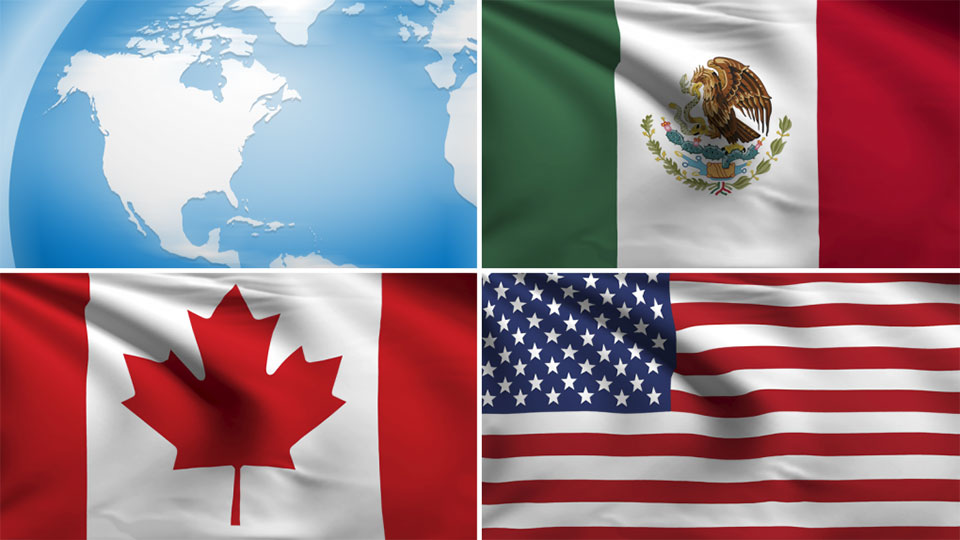
WASHINGTON (PAI)—A year after it took effect, the impact of the U.S.-Mexico-Canada trade pact (USMCA) is still uncertain, the top trade official for the Steelworkers told Congress.
One reason, added Benjamin Davis, international affairs director for the union, is the sheer size of the task the USMCA requires in order to free Mexican workers from almost a century of pro-government, company-dominated “unions” and allow them to freely choose who speaks for them—and to negotiate new collective bargaining agreements.
That involves not only setting up independent unions but also reviewing, revising, and voting on 80,000 contracts in Mexico, a giant task that will take until May 2023 if the understaffed Mexican labor office charged with the job processes 125 contracts a day, he said.
“Workers’ rights to secure democratic unions and collective bargaining have been denied in Mexico for many years and the jury is still out as to whether Mexico’s new (labor) laws and the USCMA will make a difference,” Davis told the Senate Finance Committee.
“Without a fundamental shift from protection unions…towards democratic labor organizations, no amount of government oversight will result in a trade union movement that can organize and bargain for higher wages for Mexican workers to address the structural inequality in the USMCA region that drives both migration and loss of good manufacturing jobs” from the U.S., he summarized.
Organized labor played a large role in redrafting the USMCA
Davis reminded the senators at the July 27 session the initial USMCA from the GOP Trump regime had inadequate remedies for labor exploitation. That would have encouraged firms to continue to decamp from the U.S. and Canada to exploit low-paid workers, repression, and lack of environmental rules.
And despite the labor-backed and crafted rewrites, some U.S. manufacturers still close up shop here and migrate to Mexico, thinking Mexican conditions are like those which existed for decades, including the 25 years of the jobs-losing North American Free Trade Agreement.
One key problem, Davis said, is lack of commitment to key USMCA “rules of origin” provisions that mandate a higher percentage of North American content in cars and trucks made and sold in the North American market.
Attempts to weaken provisions
“Reported recent attempts by Canada and Mexico to weaken these provisions threaten to roll back a commitment made to U.S. autoworkers and must be rejected, warned Davis, who also chairs the independent Mexico Labor Export Board, a commission the U.S. law implementing the USMCA set up to monitor Mexican working conditions.
“Likewise, the continuing drumbeat of plant closings and relocations to Mexico underscores the urgent need for reauthorization of Trade Adjustment Assistance as well as reform of the WARN Act,” the 33-year-old plant closing law, Davis said.
Organized labor pushed that statute through Congress, requiring firms that employ at least 50 workers to give them at least 60 days’ notice of either shutdowns or major cuts in numbers on the job.
But low Mexican wages, a condition that preceded NAFTA for years and that still exists, despite the USMCA’s requirement for an average minimum wage in Mexican car plants, still are a draw for U.S. and Canadian manufacturers, including the Detroit 3, Davis said.
In 2008, according to a chart Davis presented to senators, the median hourly compensation—wages and benefits—for a U.S. autoworker was $41.91. That’s the point at which half of the workers were above the figure and half below. Eight years later, still under NAFTA, that figure had risen by 2% a year, compounded, to $48.97. In those same years, a Mexican auto worker’s hourly compensation declined from $6.39 to $4.68.
The story was the same in “primary and fabricated metals,” which includes steel, though the U.S. wage hike percentage was larger (from $30.21 to $35.87, or 2.2% yearly), and the Mexican wage decline was smaller (from $5.04 to $4.17 or 2%).
“We pushed for changes in rules of origin for steel. We advocated for changes to provisions that would limit patients’ access to medicines. Environmental provisions needed to be enhanced. All of the provisions of the agreement require oversight to ensure their proper implementation, monitoring, and enforcement,” Davis said.
“Most critical to our support was the emphasis on labor rights improvements in Mexican law,” Davis added. Mexico’s new labor law “disrupts the protection union system in Mexico under which most workers have no real voice in choosing their union representatives and often have no knowledge of the contract that determines their wages and working conditions.”
Enforcing it is another matter. Not only is the task overwhelming, but Mexico isn’t spending the enforcement money it’s getting from the U.S., Davis explained.
“As of today, Mexico reports 1,378 (contract) legitimation votes have been held, covering 797,587 workers, or about 18% of the estimated unionized workforce,” Davis said. “Government officials ultimately expect at least 80,000 contracts to be voted on. This would require about 120 legitimation votes per day, every day, from now until May 1, 2023,”
“That clearly exceeds the capacity of the government institutions,” he deadpanned.
Only 29 staffers for oversight
The Mexican contract enforcement office, which handles the legitimations, has only 29 staffers and may have to employ “private notaries hired by the incumbent unions.” Doing so “creates an inherent conflict of interest and potentially disastrous consequences,” for workers in Mexico and, indirectly, the U.S., he noted.
As for money, Congress appropriated $180 million for USMCA implementation, covering workers’ rights and country of origin requirements, among other issues. But the U.S. has sent only $50 million and only $10 million of that goes to aiding Mexican workers in creating independent unions, Davis noted.












Comments